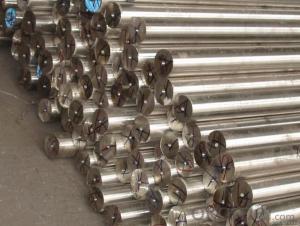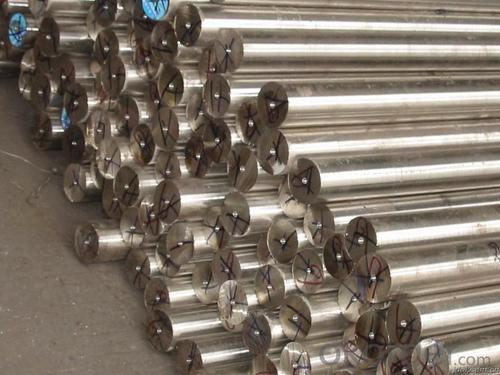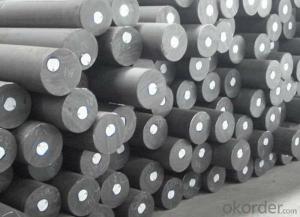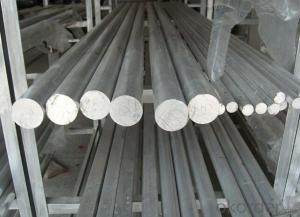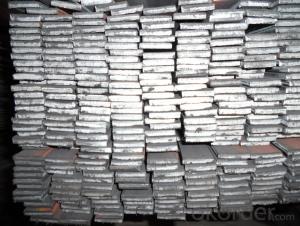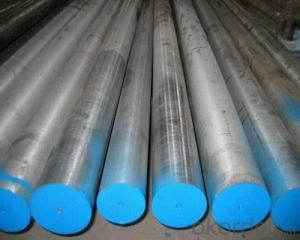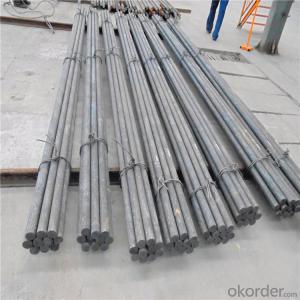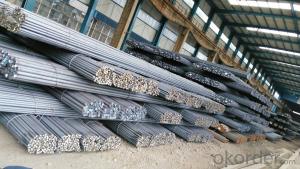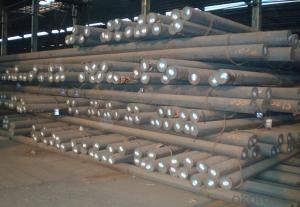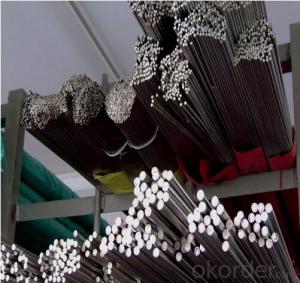Forged 1.2436 Tool Steel,D6 Steel Round Bar
- Loading Port:
- China main port
- Payment Terms:
- TT OR LC
- Min Order Qty:
- 25 m.t.
- Supply Capability:
- 10000 m.t./month
OKorder Service Pledge
OKorder Financial Service
You Might Also Like
Specification
Forged 1.2436 tool steel,D6 Steel Round Bar
Grade: X210CrW12/1.2436/SKD2/D6
Chemical composition:
Standard | Chemical composition | C | Si | Mn | S | P | Cr | Ni |
DIN |
% | 2.00/ 2.25 | 0.10/ 0.40 | 0.15/ 0.45 | ≤ 0.030 | ≤ 0.030 | 11.00/ 12.00 | 0.60/ 0.80 |
Size:
Round bar | Diameter (mm) | Length (mm) | |
50~500 | 2000~5800 | ||
plate/sheet | Thickness (mm) | Width (mm) | Length (mm) |
20~400 | 80~1000 | 2000~5800 |
Surface treatment :
Round bar : Black /Grinding / Polished / Peeled / Turned
Steel plate : Black / Milling / Machined
Characteristic:
1. High carbon and high chromium,
2. Dimensionally stable and ledeburitic 12 % Cr alloyed cold work tool steel
3. Non-deforming, low distorsion and better hardenability
4. High compressive strength and high surface hardness after hardening
Application:
1.2436 is for making high performance cutting, blanking tools up to 4 mm sheet thickness,
woodworking tools, thread rolling dies, deep drawing and cold extrusion tools, measuring tools,
scraping and trimming tools, deburing tools, moulds for abrasive plastics.
Business Terms
Lead time: 40 days after contract
Port of unloading : Shanghai/Wuhan/Ningbo
Productivity: 4000 metric ton per month
Marketing : America/Asia/Europe
Product show:

Workshop show:

FAQ:
1, Your advantages?
professional products inquiry, products knowledge train (for agents), smooth goods delivery, excellent customer solution proposale
2, Test & Certificate?
SGS test is available, customer inspection before shipping is welcome, third party inspection is no problem
3, Payment Terms?
30% TT as deposit and 70% before delivery.
Irrevocable L/C at sight.
4, Trading Terms?
EXW, FOB, CIF, FFR, CNF
5, After-sale Service?
We provides the services and support you need for every step of our cooperation. We're the business partner you can trust.
For any problem, please kindly contact us at any your convenient time.
We'll reply you in our first priority within 24 hours.
- Q: How does special steel perform in terms of corrosion resistance in marine environments?
- Special steel alloys, specifically designed for marine environments, exhibit excellent corrosion resistance. Due to their higher levels of alloying elements like chromium, nickel, and molybdenum, these steels form a protective oxide layer that prevents rusting and pitting, even when exposed to saltwater and other harsh marine conditions. Their exceptional corrosion resistance ensures prolonged durability, reduced maintenance, and enhanced performance in marine environments.
- Q: What are the emerging trends in the special steel industry?
- Some of the emerging trends in the special steel industry include the growing demand for advanced high-strength steels (AHSS) in automotive applications due to their lightweight and high performance properties. Additionally, there is an increasing focus on sustainability and eco-friendly manufacturing processes, leading to the development of cleaner production methods and the use of recycled materials. Furthermore, advancements in technology and innovation are driving the adoption of specialty steels in sectors such as aerospace, energy, and construction.
- Q: How does special steel contribute to reducing product downtime?
- Special steel contributes to reducing product downtime by offering superior strength, durability, and corrosion resistance compared to regular steel. This allows for the manufacturing of high-performance components that can withstand harsh operating conditions, reducing the likelihood of breakdowns or failures. Additionally, special steel's enhanced wear resistance prolongs the lifespan of products, minimizing the need for frequent replacements or repairs. Overall, the use of special steel in various industries helps to ensure reliable and uninterrupted operation, leading to reduced downtime and increased productivity.
- Q: How does special steel contribute to the renewable energy conversion efficiency?
- Special steel plays a crucial role in improving the renewable energy conversion efficiency by offering enhanced mechanical properties, corrosion resistance, and temperature resistance. It is used in the manufacturing of various renewable energy components such as wind turbine blades, solar panels, and hydroelectric power systems. The strength and durability of special steel ensure that these components can withstand harsh environmental conditions, resulting in increased efficiency, reliability, and lifespan. Additionally, special steel's high thermal conductivity allows for efficient heat transfer in concentrated solar power plants, further optimizing energy conversion.
- Q: What are the different inspection methods used for special steel?
- There are several inspection methods used for special steel, including visual inspection, magnetic particle inspection, ultrasonic inspection, and dye penetrant inspection. Visual inspection involves examining the steel for any surface defects or irregularities. Magnetic particle inspection uses magnetic fields and iron particles to detect any cracks or defects in the steel. Ultrasonic inspection involves sending high-frequency sound waves through the steel to identify any internal flaws or defects. Dye penetrant inspection involves applying a colored liquid to the steel's surface, which seeps into any cracks or defects, revealing their presence. These methods help ensure the quality and integrity of special steel products.
- Q: What is the cost of special steel compared to regular steel?
- The cost of special steel is generally higher compared to regular steel due to its higher quality, specific composition, and unique properties, which make it more suitable for specialized applications.
- Q: Can special steel be used in construction?
- Yes, special steel can definitely be used in construction. Special steel refers to steel alloys that have been specifically designed and manufactured to possess certain properties and characteristics that make them suitable for various applications, including construction. One of the most common types of special steel used in construction is known as structural steel. This type of steel is specifically designed to have higher strength, durability, and flexibility compared to regular carbon steel. Structural steel is often used in the construction of buildings, bridges, and other infrastructure projects due to its ability to withstand heavy loads and resist external forces such as wind, earthquakes, and impact. Special steel also offers other advantages in construction. For example, stainless steel is commonly used in the construction of architectural features and building facades due to its corrosion resistance and aesthetic appeal. Additionally, weathering steel, which forms a protective rust-like coating when exposed to the elements, is often used in outdoor structures and bridges to eliminate the need for regular painting and maintenance. Furthermore, special steel can be tailored to meet specific requirements in construction projects. For instance, high-strength low-alloy (HSLA) steel is used in the construction of tall buildings and structures to reduce weight while maintaining structural integrity. This allows for more efficient use of materials and cost savings. In summary, special steel is widely used in construction due to its superior strength, durability, corrosion resistance, and other desirable properties. Its versatility allows for the optimization of construction projects, ensuring safety, longevity, and cost-effectiveness.
- Q: How is alloy steel used in the manufacturing of gears and shafts?
- Alloy steel is commonly used in the manufacturing of gears and shafts due to its superior strength, durability, and resistance to wear and tear. The combination of iron with other elements, such as chromium, nickel, or molybdenum, enhances its mechanical properties, making it suitable for heavy-duty applications. Alloy steel gears and shafts can withstand high loads and torque, ensuring smooth operation and prolonged lifespan in various industrial sectors, including automotive, aerospace, and machinery.
- Q: What are the properties of electrical resistance steel?
- Electrical resistance steel, also known as resistivity steel, possesses specific properties that make it suitable for various electrical applications. This type of steel has a high resistivity, meaning it resists the flow of electrical current more than other materials. It also exhibits low electrical conductivity, making it an ideal choice for applications that require insulation or the control of electrical current. Additionally, electrical resistance steel typically has good mechanical strength, corrosion resistance, and can withstand high temperatures, making it suitable for use in electrical resistors, heating elements, and other similar devices.
- Q: How does special steel perform in cryogenic corrosion resistance?
- Special steels possess exceptional capabilities in terms of resisting corrosion in cryogenic environments. Unlike regular steels, which tend to become brittle and prone to corrosion when exposed to extremely low temperatures, special steels are specifically engineered to endure such conditions while maintaining their mechanical properties and corrosion resistance. The remarkable performance of special steels in cryogenic settings can be primarily attributed to their composition and microstructure. These steels are typically infused with elements like nickel, molybdenum, and nitrogen, which significantly enhance their ability to withstand corrosion at low temperatures. Additionally, the microstructure of special steels is meticulously controlled, resulting in a fine grain size and a uniform distribution of alloying elements. This microstructure contributes to the steel's capacity to resist corrosion and retain its mechanical strength even in cryogenic temperatures. Furthermore, special steels undergo rigorous testing procedures to ensure their suitability for cryogenic applications. They are subjected to low-temperature impact tests, which evaluate their toughness and resistance to brittle fracture. These tests verify that the steel can endure the stresses and strains imposed by cryogenic conditions without experiencing failure. In conclusion, special steels exhibit exceptional resistance to cryogenic corrosion due to their distinct composition, microstructure, and comprehensive testing. They are the preferred choice for applications that demand reliable performance in extremely low temperatures, such as in the aerospace, energy, and scientific research industries.
Send your message to us
Forged 1.2436 Tool Steel,D6 Steel Round Bar
- Loading Port:
- China main port
- Payment Terms:
- TT OR LC
- Min Order Qty:
- 25 m.t.
- Supply Capability:
- 10000 m.t./month
OKorder Service Pledge
OKorder Financial Service
Similar products
Hot products
Hot Searches
Related keywords
